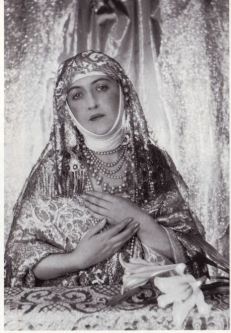 History usually remembers ambitious people, who applied themselves to a chosen profession or cause and excelled. That is not exactly the case with Dorothy Ierne Wilde — better known as “Dolly” Wilde.
History usually remembers ambitious people, who applied themselves to a chosen profession or cause and excelled. That is not exactly the case with Dorothy Ierne Wilde — better known as “Dolly” Wilde.
Dolly was born in London on July 11, 1895 — three months after her uncle Oscar Wilde was arrested for committing homosexual acts. She never met her uncle, but they had a a lot in common. (Not just the whole homosexuality thing, actually. But, you know, that too.) She was the daughter of Willie Wilde and Sophie Lily Lees and had no siblings. Willie died only in March of 1899 — leaving the three year old Dolly to be raised by her mother and her mother’s new husband, the journalist and translator Alexander Teixeira de Mattos.
There’s not much else available about her childhood (except that she liked to eat sugar cubes dipped in her mother’s perfume — ew), but in 1914 she made her way to France in order to drive ambulances for the war effort. While living in Paris during the war, Dolly met Standard Oil heiress Marion “Joe” Carstairs and the two began a hot and heavy relationship. The relationship didn’t last particularly long, but Dolly seemed to have found her calling: having rich friends.

After World War I ended, Dolly became, basically, a full-time socialite. She wasn’t wealthy by any means, although her stepfather left her some money when he died in 1921, and mostly survived off the generosity of her friends. She lived in their guest bedrooms, or in hotel rooms, and even sometimes in apartments that she borrowed. She did all she could to live a wild, glamorous life. She had a great talent for telling stories (apparently a hereditary trait), which made her popular at parties and salons, though she never used this talent to actually pursue a career. during these years she went through a string of lovers including with the silent film actress Alla Nazimova (who starred in the 1922 movie Salomé which was based on Oscar Wilde’s book). She referred to these no-strings-attached daliances as “emergency seductions.” She also caught the ire of F. Scott Fitzgerald by flirting with Zelda Fitzgerald. Although only interested in women, Dolly enjoyed the attention she received from men as well — several men over the years proposed marriage to her, but she refused them all. Other than her promiscuity, Dolly was also an alcoholic, and developed an addiction to heroin.

If any of this sounds like Dolly had tons in common with Oscar Wilde, I’m just going to point out that her nickname was “Oscaria” and she was quoted as saying “I am more like Oscar than Oscar himself.” Which is a seriously bold claim to make about someone you’ve never met. So it’s little surprise that when Oscar Wilde-super fan Natalie Clifford Barney saw her picture, and saw the family resemblance, she invited Dolly to her renowned Friday night literary salons. Dolly fell in love with Natalie, and the two were together from 1927 until Dolly’s death. The two attended numerous parties together, raising Dolly’s profile significantly — particularly in 1930 when they attended a masquerade ball and Dolly, dressed as her uncle Oscar, was described as “looking important and earnest” in The New Yorker‘s “Letter from Paris” column, written by Janet Flanner.
Dolly attempted to get clean of heroin addiction on multiple occasions — to no avail. During one stay in a nursing facility, she developed a new addiction to paraldehyde — a sleeping pill that was, at the time, available without a prescription. In 1939, Dolly was diagnosed with breast cancer. She decided to explore alternative treatments, stubbornly refusing surgery. With hostile German forces approaching Paris in 1940, she fled back to England — where she was still living when she passed away on April 10, 1941. A coroner could not determine the cause of death, she may have died from cancer or she may have died from a drug overdose.
She left very little behind — 200 of letters to friends and lovers, a passage written in Ladies Almanack, and the testimonies of those who knew her published in Natalie Clifford Barney’s In Memory of Dorothy Ierne Wilde: Oscaria ten years after Dolly passed away.